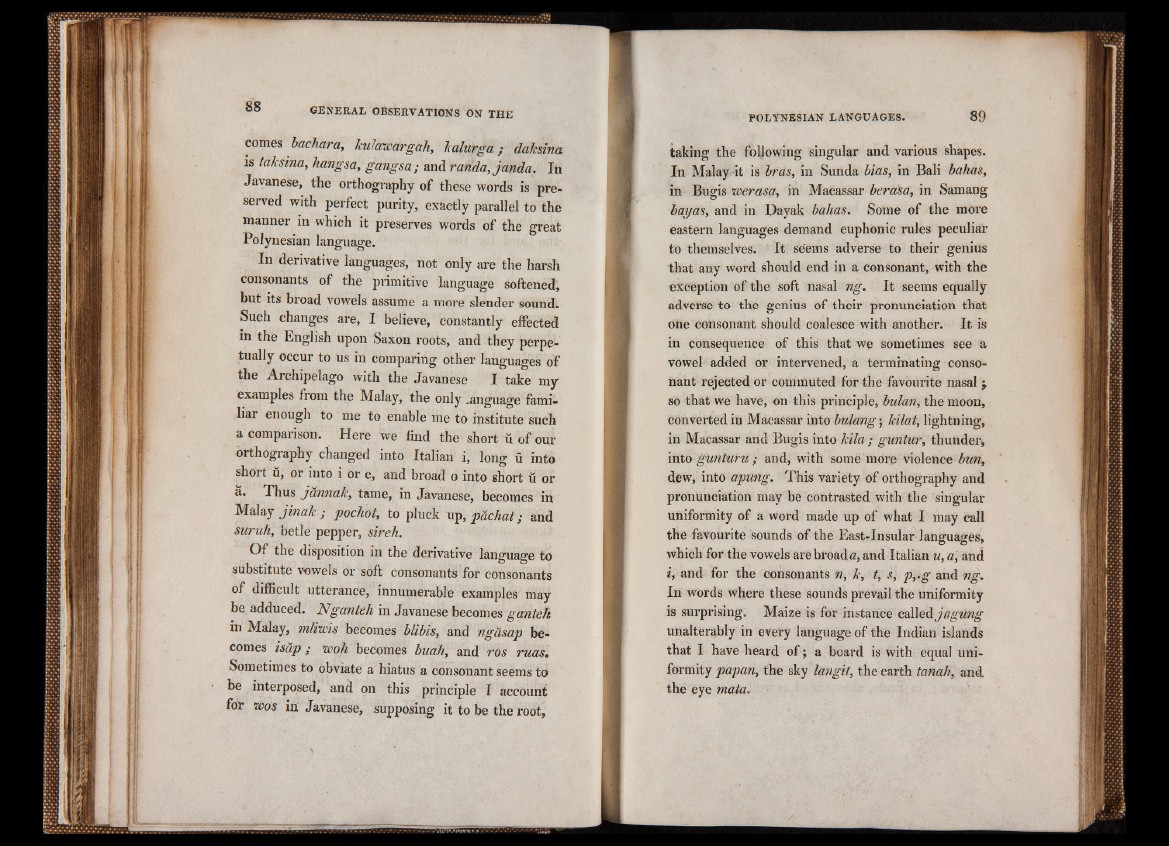
comes backara, huloewargah, Icalurga ; dalcsina
is taksina, hangsa, gangsa ; andranda,janda. Iii
Javanese, the orthography of these words is preserved
with perfect purity, exactly parallel to the
manner in which it preserves words of the great
Polynesian language.
In derivative languages, not only are the harsh
consonants of the primitive language softened,
but its broad vowels assume a more slender sound.
Such changes are, I believe, constantly effected
^he English upon Saxon roots, and they perpetually
occur to us in comparing other languages of*
the Archipelago with the Javanese I take my
examples from the Malay, the only ^.anguage familiar
enough to me to enable me to institute such
a comparison. Here we find the short Ü of our
orthography changed into Italian i, long ü into
short ü, or into i or e, and broad o into short ü or
R* Thus j annale, tame, m Javanese, becomes in
Malay jinak ; pochot, to pluck up, pâchat ; and
suruh, betle pepper, sirek.
Of the disposition in the derivative language to
substitute vowels or soft consonants for consonants
of difficult utterance, innumerable examples may
be adduced. Nganteh in Javanese becomes ganteh
in Malay, mliwis becomes blibis, and ngasap becomes
isap ; tvoh becomes buah, and vos ruas.
Sometimes to obviate a hiatus a consonant seems to
be intei posed, and on this principle I account
for 'Wos in Javanese, supposing it to be the root,
taking the following singular and various shapes.
In Malay-it is bras, in Sunda bias, in Bali bahas,
in Bugis werasa, in Macassar berasa, in Samang
bayas, and in IJayak bahas. Some of the more
eastern languages demand euphonic rules peculiar
to themselves. It seems adverse to their genius
that any word should end in a consonant, with the
exception of the soft nasal ng. It seems equally
adverse to the genius of their pronunciation that
one consonant should coalesce with another. It is
in consequence of this that we sometimes see a
vowel added or intervened, a terminating consonant
rejected or commuted for the favourite nasal j
so that we have, on this principle, bulan, the moon,
converted in Macassar into bulang ; Jcilat, lightning,
in Macassar and Bugis into kila ; guntur, thunder^
into gunturu ; and, with some more violence bun,
dew, into apung. This variety of orthography and
pronunciation may be contrasted with the singular
uniformity of a word made up of what I may call
the favourite sounds of the East-Insular languages,
which for the vowels are broad a, and Italian u, a, and
i, and for the consonants n, k, t, S, p,.g and ng.
In words where these sounds prevail the uniformity
is surprising. Maize is for instance called jagung
unalterably in every language of the Indian islands
that I have heard of ; a board is with equal uniformity
pagan, the sky langit, the earth tanah, and
the eye mata.